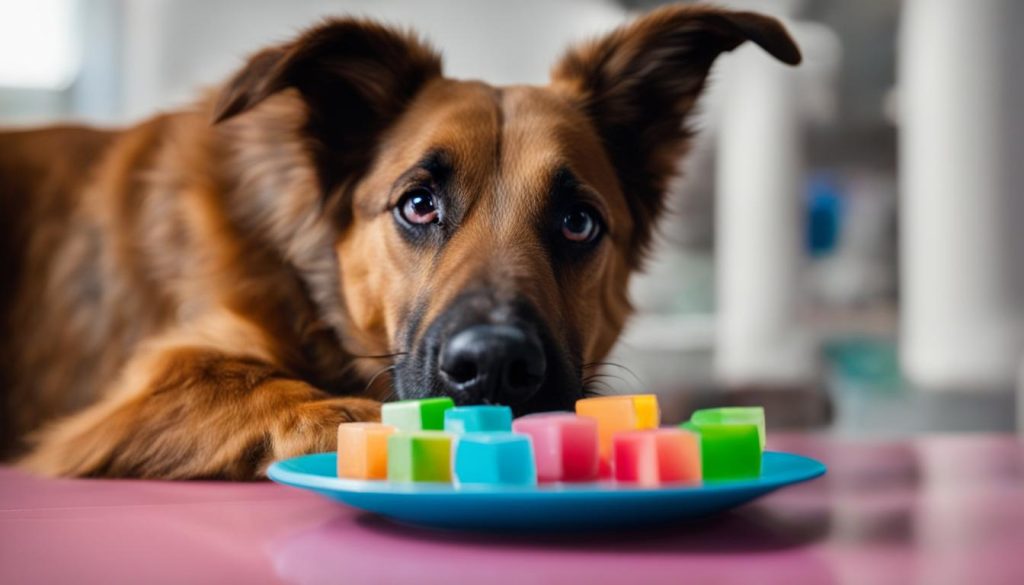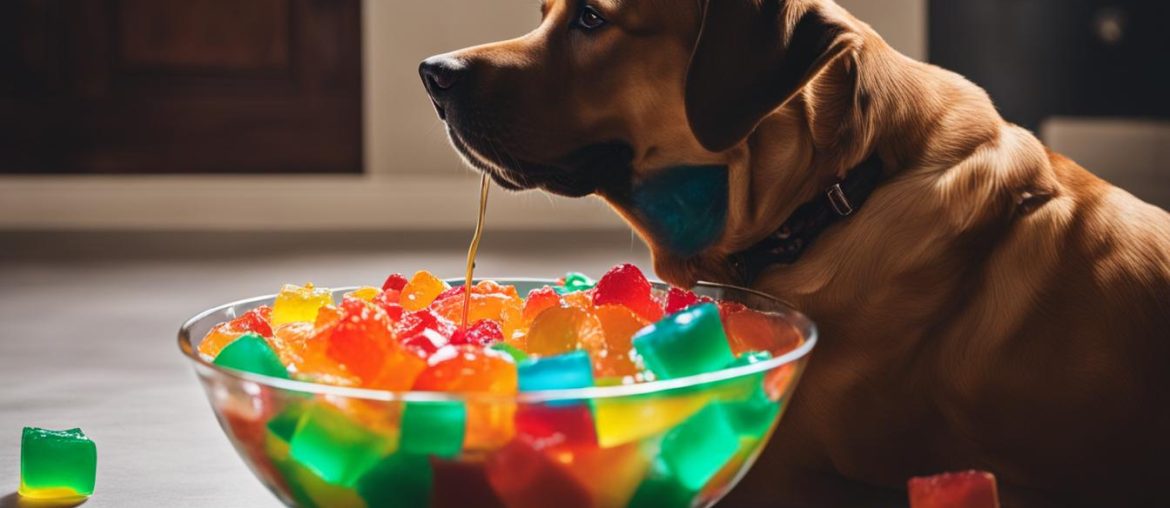Jello, a sweet and fruity dessert made from gelatin, sugar, artificial colors, and flavors, is a nostalgic treat for many humans. However, when it comes to our furry friends, it’s important to prioritize their health and well-being. In this article, I will discuss whether dogs can eat jello, the ingredients in jello, and the potential risks associated with feeding it to dogs. Let’s dive in!
Key Takeaways:
- Jello is not recommended for dogs due to its unhealthy ingredients and potential risks.
- The ingredients in jello, such as sugar and artificial additives, can be harmful to dogs.
- Sugar in jello can lead to weight gain, dental issues, and health problems like diabetes.
- Artificial flavors and colors may cause digestive upset or allergic reactions in dogs.
- If your dog accidentally consumes jello, remove any remaining jello and monitor their condition. Contact your veterinarian if required.
What Is in Jello?

Jello is a popular dessert that is enjoyed by many people. It is a sweet, fruit-flavored jelly that is made from several ingredients. Let’s take a closer look at what exactly is in jello:
“Jello is a gel-like substance that is made primarily from gelatin, sugar, artificial flavors, artificial colors, and preservatives.”
The main ingredient in jello is gelatin. Gelatin is derived from animal collagen and gives jello its unique texture. Sugar is another key component of jello, providing the sweet taste that many people enjoy. Artificial flavors and colors are added to enhance the taste and appearance of jello. Preservatives are also included to extend the shelf life of the product.
Please be aware that while jello may be a fun and nostalgic treat for humans, it is not recommended for dogs. The ingredients in jello can be unhealthy for dogs and may pose risks to their health. It’s crucial to prioritize your dog’s well-being and choose safer alternatives for treats and snacks.
| Ingredient | Description |
|---|---|
| Gelatin | Derived from animal collagen, gives jello its texture |
| Sugar | Provides the sweet taste of jello |
| Artificial flavors | Enhances the taste of jello |
| Artificial colors | Adds vibrant colors to jello |
| Preservatives | Extends the shelf life of jello |
Can Dogs Eat Jello?

When it comes to jello, it’s important to understand that it’s not a suitable treat for dogs. While plain gelatin may be safe in small amounts, jello contains additional ingredients that can be harmful to our canine companions. The high sugar content in jello can lead to weight gain, dental issues, and potential health problems like diabetes. Furthermore, jello often includes artificial flavors and colors that may cause digestive upset or allergic reactions in dogs. As responsible pet owners, it’s best to avoid giving jello to our furry friends and opt for healthier alternatives for treats and snacks.
“Dogs should not eat jello. While small amounts of plain gelatin may be safe for dogs, the other ingredients in jello, such as sugar and artificial additives, can be harmful.”
To emphasize the importance of avoiding jello for dogs, it’s crucial to prioritize their health and well-being. Instead of indulging them with jello, consider homemade gelatin treats made with dog-friendly ingredients or natural fruit gelatin. These alternatives provide a safer and more nutritious option, ensuring that our dogs can enjoy their treats without compromising their health. As always, it’s best to consult with your veterinarian for personalized advice on your dog’s diet and any specific dietary restrictions they may have.
Can Dogs Eat Sugar-Free Jello?

Dogs should not eat sugar-free jello. While jello already poses risks to dogs due to its ingredients, sugar-free jello can be even more dangerous. Sugar-free jello often contains artificial sweeteners like xylitol, which can be highly toxic to dogs. Xylitol can cause a dangerous drop in blood sugar levels, leading to seizures, liver failure, and even death. It’s crucial to avoid giving any jello products, including sugar-free varieties, to dogs to ensure their safety and well-being.
If you suspect that your dog has consumed sugar-free jello or any product containing xylitol, it is important to seek immediate veterinary care. Time is of the essence when dealing with xylitol toxicity, as prompt treatment can greatly improve the chances of a positive outcome.
Remember, prevention is key. Always keep jello and sugar-free jello products out of your dog’s reach. Instead, focus on providing your dog with dog-friendly treats and snacks that are safe and nutritious for them.
Can Dogs Eat Gelatin?

When it comes to feeding gelatin to dogs, it’s important to consider the safety and potential benefits. While plain gelatin can be a safe and nutritious addition to your dog’s diet, it’s essential to avoid gelatin products that contain harmful additives or sweeteners. Here’s what you need to know about feeding gelatin to your furry friend.
Plain, unflavored gelatin derived from animal sources, such as beef gelatin, can provide some benefits for dogs. Gelatin contains amino acids that support joint health, improve coat and skin condition, and aid in digestion. However, it’s crucial to ensure that the gelatin you’re giving your dog is free from added sugars, artificial sweeteners, and other potentially harmful ingredients.
When incorporating gelatin into your dog’s diet, it’s best to start with small amounts and monitor their response. You can add plain gelatin to homemade dog treats or mix it into their meals in moderation. Remember to consult with your veterinarian to determine the appropriate amount of gelatin based on your dog’s size, health condition, and dietary needs.
In summary, dogs can eat plain gelatin in moderation, such as beef gelatin. It can provide nutritional benefits and support their overall health. However, always prioritize your dog’s well-being by avoiding gelatin products with added sugars, artificial sweeteners, or other harmful additives. Consult with your veterinarian for personalized advice on your dog’s diet and specific dietary restrictions.
How Much Gelatin Should I Give My Dog?
When it comes to giving gelatin to your dog, it’s important to consider the appropriate dosage based on their size. The recommended amount of gelatin for dogs can vary depending on their weight and individual needs.
As a general guideline, you can give your dog approximately 1 teaspoon of plain gelatin per 10 pounds of body weight. For example, if your dog weighs 30 pounds, you can offer them around 3 teaspoons of gelatin. However, it’s crucial to start with a smaller amount and monitor your dog’s response before increasing the dosage.
It’s also essential to consult with your veterinarian before introducing gelatin or any other supplements into your dog’s diet. They can provide personalized guidance based on your dog’s specific health needs and make recommendations on the appropriate dosage.
If you are unsure about how much gelatin to give your dog or have any concerns, it’s always best to consult with your veterinarian.
| Dog Weight | Recommended Gelatin Dosage |
|---|---|
| 10 pounds | 1 teaspoon |
| 20 pounds | 2 teaspoons |
| 30 pounds | 3 teaspoons |
| 40 pounds | 4 teaspoons |
Remember, moderation is key when giving gelatin to your dog. While gelatin can have potential benefits for their skin and joints, excessive consumption can lead to digestive issues or upset stomach. Always monitor your dog’s response to gelatin and adjust the dosage accordingly.
Additionally, it’s important to choose plain, unflavored gelatin without any added sugars or artificial ingredients. Avoid gelatin products that contain xylitol, as it is toxic to dogs.
By following the recommended dosage and consulting with your veterinarian, you can safely incorporate gelatin into your dog’s diet and potentially provide them with some health benefits.
My Dog Ate Jello – What Do I Do?
If your dog accidentally ate jello, it’s important to take immediate action to ensure their safety and well-being. Here are some steps you can follow:
- Remove any remaining jello: Prevent further consumption by removing any leftover jello from your dog’s reach.
- Assess your dog’s condition: Observe your dog for any signs of discomfort or adverse reactions. Common symptoms of jello ingestion in dogs may include digestive upset, such as vomiting or diarrhea.
- Contact your veterinarian: If your dog consumed a significant amount of jello or is experiencing concerning symptoms, it’s best to consult with your veterinarian. They can provide guidance on the next steps to take and recommend any necessary treatments.
- Provide fresh water: Make sure your dog has access to clean and fresh water to stay hydrated.
- Monitor your dog closely: Keep a close eye on your dog’s behavior and well-being. If you notice any worsening symptoms or unusual changes, contact your veterinarian immediately.
Remember, every dog is different, and their reaction to jello ingestion may vary. It’s always best to seek professional advice from your veterinarian to ensure the health and safety of your furry friend.
| Signs of Jello Ingestion in Dogs | What to Do |
|---|---|
| Vomiting or diarrhea | Monitor your dog closely and seek veterinary advice if symptoms persist or worsen. |
| Lethargy or weakness | Contact your veterinarian immediately for further evaluation and guidance. |
| Loss of appetite | Offer your dog small, bland meals and monitor their appetite. If the loss of appetite persists, consult your veterinarian. |
| Abdominal discomfort or bloating | Keep an eye on your dog’s behavior and contact your veterinarian if symptoms persist or worsen. |
| Unusual behavior or neurological symptoms | Seek immediate veterinary attention as these symptoms may indicate a more serious condition. |
Can Dogs Eat Beef Gelatin?

Dogs can safely consume beef gelatin, which is derived from beef collagen. Beef gelatin can be a beneficial addition to their diet, providing essential amino acids that support joint health and improve their coat and skin. It is important to note that not all gelatin products are safe for dogs, as some may contain harmful additives, sugars, or artificial sweeteners. When using beef gelatin for dogs, it is crucial to choose plain, unflavored options without any additional ingredients.
Adding beef gelatin to homemade dog treats or incorporating it into their meals can offer a healthy and nutritious boost. However, as with any new food, it is recommended to introduce it gradually and monitor your dog’s response. Each dog is unique, and it is essential to consult with your veterinarian to determine the appropriate amount of beef gelatin to give your specific canine companion.
“Beef gelatin can provide dogs with essential amino acids that support joint health and improve their coat and skin.”
Benefits of Beef Gelatin for Dogs
Beef gelatin offers various benefits for dogs. This natural protein source is rich in amino acids, which are essential for the growth and maintenance of healthy tissues and organs. The amino acids found in beef gelatin can support joint health, promoting improved mobility and reducing the risk of conditions such as arthritis. Additionally, these amino acids contribute to stronger and healthier skin and coat, resulting in a shiny and lustrous appearance.
Furthermore, beef gelatin can aid in digestion and gastrointestinal health. It can help strengthen the stomach lining, promoting better digestion and nutrient absorption. This can be especially beneficial for dogs with sensitive stomachs or digestive issues.
Overall, when used appropriately, beef gelatin can be a valuable dietary supplement for dogs, providing numerous health benefits. However, it is always advisable to consult with your veterinarian before introducing any new food or supplement to your dog’s diet.
Can Dogs Eat Fish Gelatin Powder?

When it comes to fish gelatin powder, dogs can safely consume this ingredient. Fish gelatin powder is made from fish collagen and can provide dogs with a good source of protein and healthy fats. Additionally, it can offer nutritional benefits for their skin and coat. It is important to introduce fish gelatin powder gradually into their diet and monitor their response to ensure they tolerate it well.
Fish gelatin powder can be incorporated into homemade dog treats or used as an additive to their meals. However, it is essential to ensure that the fish gelatin powder does not contain any harmful additives, sugars, or artificial sweeteners. Always read the product labels carefully and choose reputable brands that prioritize the quality and safety of their products.
As with any new food or ingredient, it is best to consult with your veterinarian before introducing fish gelatin powder to your dog’s diet. They can provide personalized advice based on your dog’s specific dietary needs and restrictions. Your veterinarian can also recommend appropriate serving sizes and help you determine the appropriate amount of fish gelatin powder to give to your dog based on their size and individual health requirements.
Benefits of Fish Gelatin Powder for Dogs
Fish gelatin powder is a rich source of protein and healthy fats, which can support various aspects of your dog’s health. Here are some potential benefits of incorporating fish gelatin powder into your dog’s diet:
- Promotes healthier skin and coat
- Supports joint health
- May aid in digestion
- Provides essential amino acids
Overall, fish gelatin powder can be a nutritious addition to your dog’s diet, but it’s always best to consult with your veterinarian before making any significant dietary changes or introducing new ingredients.
Can Dogs Eat Great Lakes Gelatin?
When it comes to gelatin, Great Lakes gelatin is a safe option for dogs. Made from beef collagen, this gelatin contains no harmful additives or sweeteners, making it a healthier choice compared to other gelatin products. Great Lakes gelatin can be used in homemade treats or added to your dog’s meals to provide certain health benefits.
Gelatin derived from beef collagen can promote healthier skin, coat, and joints in dogs. It is a good source of essential amino acids that support overall joint health and can improve the condition of your dog’s coat and skin. By incorporating Great Lakes gelatin into your dog’s diet, you can help enhance their overall well-being.
However, it’s important to introduce any new food gradually and monitor your dog’s response. If you notice any signs of digestive upset or allergies, discontinue the use of gelatin and consult with your veterinarian for further guidance. Every dog is unique, and it’s important to consider their individual dietary needs and restrictions.
| Benefits of Great Lakes Gelatin for Dogs |
|---|
| Promotes healthier skin and coat |
| Supports joint health |
| Improves overall well-being |
In conclusion, dogs can safely consume Great Lakes gelatin as long as it is free from harmful additives. However, it’s always recommended to consult with a veterinarian before making any significant changes to your dog’s diet. By prioritizing your dog’s health and well-being, you can provide them with safe and nutritious treats or supplements that support their overall vitality.
Wrapping Up
In conclusion, dogs should not eat jello. Jello contains ingredients that can be harmful to dogs, such as sugar, artificial sweeteners, and additives. While plain gelatin may be safe in small amounts, it’s important to prioritize your dog’s health and choose healthier alternatives for treats and snacks.
Homemade gelatin treats made with dog-friendly ingredients or natural fruit gelatin can provide a safer and more nutritious option for your canine companion. By avoiding jello and opting for homemade alternatives, you can ensure that your dog’s treats are free from potentially harmful ingredients and tailored to their specific dietary needs.
It’s always a good idea to consult with your veterinarian for personalized advice on your dog’s diet and any specific dietary restrictions they may have. Your vet can provide guidance and recommend suitable alternatives that will keep your dog healthy and happy. Remember, your furry friend’s well-being should always be the top priority!
FAQ
Can dogs eat jello?
No, dogs should not eat jello. The ingredients in jello can be unhealthy for dogs, with potential risks including digestive upset, obesity, dental issues, and even toxicity from artificial sweeteners like xylitol. It’s important to prioritize your dog’s health and choose safer alternatives for treats and snacks.
What is in jello?
Jello typically contains gelatin, sugar, artificial flavors, artificial colors, and preservatives. Gelatin, derived from animal collagen, gives jello its signature texture. However, the high sugar content in jello can be detrimental to a dog’s health. Artificial flavors and colors in jello are made from chemicals and may have unknown effects on dogs. Preservatives are added to extend the shelf life of the product.
Can dogs eat sugar-free jello?
No, dogs should not eat sugar-free jello either. Sugar-free jello often contains artificial sweeteners like xylitol, which can be highly toxic to dogs. Xylitol can cause a dangerous drop in blood sugar levels, leading to seizures, liver failure, and even death. It’s crucial to avoid giving any jello products, including sugar-free varieties, to dogs to ensure their safety and well-being.
Can dogs eat gelatin?
Dogs can eat plain, unflavored gelatin in small amounts. Gelatin can even have some benefits for dogs, such as promoting healthier skin and joints. However, it’s important to avoid giving gelatin products that contain sugar, artificial sweeteners, or other potentially harmful additives. Plain gelatin derived from animal sources, such as beef gelatin, can be a safe option for dogs when used in homemade treats or added to their meals in moderation.
How much gelatin can I give my dog?
The amount of gelatin you can give to your dog depends on their size. As a general guideline, you can give them:
- Small dogs: 1/4 to 1/2 teaspoon
- Medium dogs: 1/2 to 1 teaspoon
- Large dogs: 1 to 2 teaspoons
My dog ate jello – what do I do?
If your dog accidentally eats jello, it’s important to take immediate action. Remove any remaining jello to prevent further consumption. Assess your dog’s condition and watch for any signs of discomfort or adverse reactions. If your dog consumed a significant amount of jello or is experiencing concerning symptoms, contact your veterinarian for guidance. Provide fresh water and monitor your dog closely. Follow any recommendations from your vet regarding temporary dietary modifications or treatments if necessary.
Can dogs eat beef gelatin?
Dogs can eat beef gelatin, such as plain unflavored gelatin derived from beef collagen. Beef gelatin can be a beneficial ingredient for dogs, providing essential amino acids that support joint health and improve their coat and skin. Just ensure that it does not contain any harmful additives, sugars, or artificial sweeteners. Homemade treats made with beef gelatin or adding it to your dog’s meals in moderation can be a safe and healthy addition to their diet.
Can dogs eat fish gelatin powder?
Dogs can eat fish gelatin powder, which is made from fish collagen. Fish gelatin can be a good source of protein and healthy fats for dogs. It can also provide nutritional benefits for their skin and coat. Use fish gelatin powder in homemade dog treats or as an additive to their meals. However, as with any new food, introduce it gradually and monitor your dog’s response.
Can dogs eat Great Lakes gelatin?
Yes, dogs can eat Great Lakes gelatin. Great Lakes gelatin is made from beef collagen, making it a safe source of gelatin for dogs. It does not contain any harmful additives or sweeteners. You can use Great Lakes gelatin in homemade treats or as an additive to your dog’s meals. It can provide some health benefits for your dog’s skin, coat, and joints.






